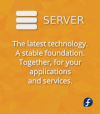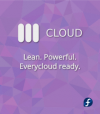Announcing Fedora 23
The Halloween weekend is over, so you know what that means. The new Fedora 23 release is here, and it's better than ever before. We're please to bring you the latest versions of the three main Fedora editions – Fedora Workstation, Fedora Cloud and Fedora Server - each built with love, from the Fedora community to custom-fit your needs in different areas. Versions are also available in Spins, Labs and ARM.
If this was enough to convince you, download it here, or if you already use Fedora, upgrade it here.
Fedora Cloud
Fedora Server
 |
Fedora Server makes service management simple with RoleKit, a programmatic interface for quick deployment, and Cockpit, a remote web GUI. Now in Fedora Server 23, you can manage Kubernetes clusters from the Cockpit Admin Console, or launch a FreeIPA domain controller from a kickstart file. Get Fedora Server this morning and have an identity management solution in place by lunchtime. |
Fedora Workstation
 |
If you're a laptop or home user, hobbyist, enthusiast, student, or a software developer, Fedora Workstation is perfect for you. Fedora Workstation includes the newest release of the GNOME desktop, which makes your everyday computing simple, polished, and pleasant. Experience the sleek interface and powerful tools for yourself -- download Fedora Workstation now! |
Spins, Labs, and ARM
Fedora is also available for several purpose:
| Fedora Spins are alternative desktops for Fedora that provide a different experience than the standard Fedora Workstation edition. For instance, the Fedora KDE and Fedora Xfce spins provide popular alternatives to GNOME for Fedora users who enjoy the KDE or Xfce experience.
There's a new spin in town for Fedora 23. Want a classic take on a modern desktop? If so, the Cinnamon spin may just be what you're hoping to find. Fedora 23 includes a spin that tries to emulate the GNOME 2 experience using GNOME Shell from GNOME 3.x. Learn more at Cinnamon. Sugar on a Stick is a stand-alone implementation of the desktop environment originally designed for the One Laptop per Child project. Fedora's SoaS spin has been updated to Sugar 0.106, for better performance, updated activities, and a new "social help" feature for collaborative learning. Get Fedora 23 Spins. | |
| Fedora Labs are curated software collections. You can find updated live media focused on Games, Design, Robotics, and more. Get Fedora 23 Labs. | |
| suitable for ARM-based computers used as servers, typically in a headless environment.Get Fedora 23 Arm. |
User Point of View: Improvements
- The Workstation release is shipped with Gnome 3.18 and the first relevant improvement for a user is due to the possibility of accessing the files stored in Google Drive by Nautilus just enabling the online accounts (if not done in the first time logging, the online account can be handled from the settings widgets), The access will granted immediately and a icon (just like a network one) will be placed in the left bar.
- For the VM lovers, Boxes now allows to filter remote or local boxes, and their visual has been improved as well. Other improvements (generally adaptations) have been introduced to facilitate some actions.
- Of course one of the best pleasant surprises is related to the introduction of LibreOffice 5 which brings with it an increased accuracy in importing files from others suite and an enhancement of Calc complex formulas.
- There is, also, a further step ahead for the next Fedora X server: Wayland
- In general applications had some graphic enhancements.
System Point of View: Improvements
Fedora-Wide Changes
Fedora 23 includes a number of changes that will improve all of the editions. For example, Fedora 23 makes use of compiler flags to improve security by "hardening" the binaries against memory corruption vulnerabilities, buffer overflows, and so on. This is a "behind the scenes" change that most users won't notice through normal use of a Fedora edition, but will help provide additional system security.
Likewise, Fedora 23 has disabled SSL3 and RC4 by default due to known vulnerabilities in the protocols. This means all applications that use GNUTLS and OpenSSL libraries have had the SSL3 protocol and RC4 cipher disabled.
Fedora 23 comes with the latest version of Mono 4. This means a big improvement because we were stuck with an ancient version of Mono (2.10) for too long. All packages within Fedora that are based on Mono have been adjusted and rebuilt, to target the 4.5 version of the .Net framework. Mono 4 does not support solutions targeting v1.0, v2.0 or v3.5 of .Net, but usually they can be easily upgraded to v4.5.
Fedora 23 also includes support for Unicode 8.0, which includes new emojis, and improvements in sorting Unicode text and processing non-ASCII URLs.
Fedora Server
The Fedora Server release includes a number of interesting changes and additions.
The rolekit service now supports setting up three roles. In addition to the previously supported Domain Controller (powered by FreeIPA abd Database Server (powered by PostgreSQL) roles, Fedora Server 23 features a cache server for web applications (powered by memcached).
Rolekit can also now be used from the anaconda kickstart by passing the --deferred arguments to rolectl. For example: rolectl deploy domaincontroller --name=example.com --deferred will instruct the system to deploy the Domain Controller role on the next boot.
The Cockpit Admin Interface in Fedora Server has several big improvements as well.
- Support for SSH key authentication
- Support for configuring user accounts with their authorized keys.
- Basic cluster dashboard for driving Kubernetes on Fedora Server and Fedora Atomic Host.
- Set the timezone for your Fedora Server from the Cockpit User Interface (UI).
- Cockpit has also been made safe to use with multipath disks.
Fedora Workstation
While there's a lot going on under the hood, desktop users are also going to find Fedora 23 pretty exciting for all the obvious goodness coming to the desktop. The easiest way to experience the preview of these technologies is to download and try the Fedora 23 Workstation edition.
Naturally, GNOME is getting an upgrade, with Fedora 23 containing a preview of the upcoming GNOME 3.18 release, which is easier to use than ever. There are also many enhancements on the way, such as:
- Improvements to next-generation graphics stack Wayland, preparing it to be the default graphical server in a future release.
- Support for ambient backlight drivers, so brightness responds to the environment on laptops with the required hardware
- The Software application is smarter about metered Internet connections, and can now update system firmware
- Refreshed support for Google APIs to provide access to user data through GNOME apps (including Google Drive integration)
Users trying to get a little work done on Fedora will be happy to see LibreOffice 5 in Fedora 23. The new release includes a lot of new features and improvements:
- Style previews in the sidebar
- Microsoft Word-compatible text highlighting
- Built-in image crop
- UI for data bars in Calc
- Support for Time-Stamp Protocol in PDF export
- Support for Adobe Swatch Exchange color palettes
- Import of Apple Pages files
- Improved support for HiDPI screens
- Significantly improved support for MS Office formats
Fedora Cloud
Fedora 23 Cloud Base image includes many updates and enhancements to the underlying Fedora base packages. For example, Fedora 23 now has the latest Docker release, docker 1.8. We can now verify the publisher of an image before running. This gives the users the power to identify that the image publisher published has not been tampered with. You can find many other details about the newest Docker in this [ https://blog.docker.com/2015/08/docker-1-8-content-trust-toolbox-registry-orchestration/ announcement ].
Stay tuned for news about Fedora Atomic Host in the not too distant future!




